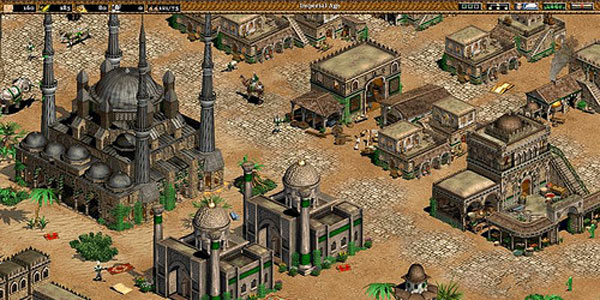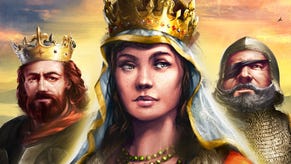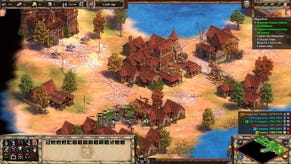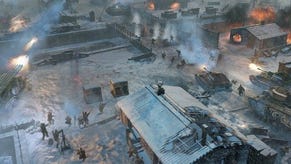Gaming Made Me: Age Of Empires II
Hello! Gaming Made Me is a new weekendly series that continues the theme of our previous Gaming Made Me excursions, which is a theme about the games that made people who they are today. In this new and fresh series various RPS chums will be invited to talk about their formative gaming experiences. This is the first one, with an Ages Of Empires II retrospective from Brendan Caldwell. Take it away, Mr C!
I like that it still comes in a box, with words on and everything. I like that the guy on the front of the box looks only moderately severe. He isn’t rabidly baring his teeth, straining his neck so hard you could strum Dragonforce on his ligaments. No, no, no. That’s not this guy’s scene. Just take a look at him. He’s wearing what is essentially a balaclava made of metal (!) then he puts a crown on it. That’s how confident he is. He doesn’t need to look gung or ho. He just looks like he’s dropped his dinner and he was really looking forward to that dinner because dinner tonight was stag fillet and you don’t get stag fillet that often in the Holy Lands let me tell you, peasant.

But you know what? Doesn’t matter. ‘Cause with a reasonably miffed look he can just order a lowly serf to go and kill another stag. It’s the middle ages, boi. This how we be.
Age of Empires II: Age of Kings occupied the same space – mechanically speaking – as Command and Conquer. Base building and unit research was big part of it. Only instead of Scorpion-tailed architecture you built a plain-looking archery range. Or maybe a castle – but only if you had the stones. Which brings us neatly to the game’s resource management. Instead of a truck groping around for a single universal resource, groups of strapping men and women mine away at gold deposits, or deforest a screen full of oak trees. They pick at stone quarries or farm crops or act as shepherds or hunt deer. This is the game’s spinal cord – them tharr working classes.
But this ain’t no anarcho-syndicalist commune. This is the feudal system. Villagers won’t just get on with it. They really, really need to be told what to work on. Otherwise, they’ll just stand around looking gormless until a sassy Frenchman on horseback comes and skewers them. As sassy equestrian Frenchmen are wont to do. I like that Frenchmen do this. But then, I like a lot of things about Age of Empires II.
I like that it taught you about Saladin years before Assassin’s Creed uninvented history. I like that it doesn’t make me nail my suspension of disbelief to the wall by the hooves (my suspension of disbelief is a Satyr) and torture it for fifteen hours, like AC: Bros in the Hoodz does, with its ridiculous unending enigma stringing you along, repeating Lost’s greatest crime.
That said, Age of Kings did take some liberties with history. But only as a matter of simplification (the research was done in a public community library and most of the reference materials came from the children’s section). So yeah. It took liberties. It took exactly four liberties:
1. They didn’t talk like that.
2. There were probably more than 75 people in Saladin’s army at any given moment.
3. They didn’t write chronicles using MS Paint. And if they did, they wouldn’t have chosen that font size.
4. Some other stuff I can’t remember.

AoE II’s history lesson is like having a really insightful conversation with a stranger while you’re hopelessly pissed. It’s not as deep as it seems. But it’s a good introduction. So when the Crusaders go dilly-dallying through a desert with a piece of the True Cross I know it’s very likely not a piece of the True Cross. But AoE II tells me that’s what it is because that’s what they believed at the time. Ha ha. Suckers.
Although.
Well, no. Ha ha. No.
Hmm. Well, there’s no way to be sure one way or the other. I suppose it could be a piece of the true cross. Ultimately, who are we to say? I mean, no. That was just common medieval superstition. Right?
See. I like that it makes you do that.
History can be handled gracefully in RTS games. Okay, maybe not gracefully, as such. Perhaps chivalrously. Between Starcraft’s future wotsits and Red Alert’s over-the-top bastardisation of the Cold War, there lies Age of Kings.
Age of Kings! You see that? Ensemble didn’t call their game that for nothing. It was good at treating history with almost monarchical respect. For the simple reason that, more than any old king or queen, history deserves a wee bit of respect. Because that’s what history is. Majestic. Regal. A bit stabby. Sometimes inbred. But mostly noble. The Total War series might have rejuvenated the real-time strategy genre by giving the player a Risk-like game of positioning and micro-management to play between battles (Mwah! Love you, Medieval) but it never had that same reverence for history as it happened. Things got invented at about the right time by the right people, sure. But according to most of my games, the Moorish capital city is Dublin, the Scots invaded Rome in 1495 and the English are a fucking myth or something ‘cause I’ve never seen ‘em. Nope. Don’t know what you mean, sir. No English here. Try Antioch or whatever. Imperialist SWINE.
I like that the game is recommended for players three years old and up and clearly prides itself on being somewhat educational. I like that, after it lures in its young players, it launches a volley of angry trebuchets at them, ruins their base, kills all their villagers and then just stands around looking incredulous. Even on the Easy setting, the later campaigns are challenging. How could a toddler deal with this? They’d have to be a Napoleonic prodigy. Twice the strategic genius, twice the tiny stature. One thing you could say for AoE II was that it didn’t patronise its audience. It screamed “This. Is. LEARNING.” Then kicked you down a well.

Okay, so it wasn’t a hundred percent accurate. Like, when Saladin lops off the sconce of the captured Raynald de Châtillon, it omits reports that another knight-dude called Guy de Lusignan was present as well. And that Saladin gave Guy some icy water to down, out of respect of a worthy adversary. And that Raynald took some of this water, without it being offered him. That’s not how Saracens roll. Ray was being a cheeky wee bastard, so Saladin chopped his head off. Natch.
There were other ways it was imperfect. But these were endearing more than anything. I like them too. I like that a building being repeatedly struck with swords and pikes will gradually burst into flames and eventually implode. I like that it boasted you could win the game by demonstrating your economic or cultural power, even though no regicidal maniac worth his enraged steed would take those routes. I like if you got bored you could just hit enter and type “how do you turn this on” and get a sports car armed with machine guns. What’s that you’ve got there Egypt? A mangonel? Face the wrath of my Shelby AC Cobra, you common shisha-pedlar!

Despite these wonderful hiccups, AoK was just that. A-okay. It is the kind of game they should teach in schools. Sadly, if you go to an Irish Catholic school, chances are they never will. They would like the William Wallace campaign. They might even like the Joan of Arc campaign.
They would not like the Saladin campaign.
Okay, let’s dismiss with any semblance of neutrality here. Let’s get personal. This is one way gaming made me. It showed me that there are things our teachers aren’t going to tell us. Whether it’s through lack of time or lack of desire, they just won’t. It showed me that you don’t need Father Angryface to learn history – even if all you learn is trivia.
I only know that Zimbabwe was once called Rhodesia thanks to Metal Gear Solid. That I know the Red Army called a truck-mounted rocket launcher a “Stalin Organ” is because of Battlefield 1942. That I took any interest in the crusades and the Middle East at all as a kid is because of Age of Empires II. We might only know little things outside the curriculum thanks to games. A little thing. A “trivial” thing. But at least we know something.
And I like that. Don’t you like that?









